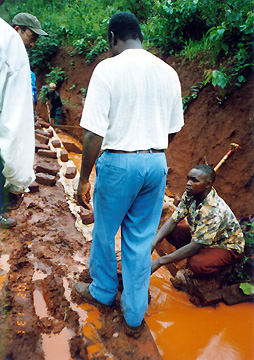
This is a story set in Mbinga province, south-western Tanzania , in January 2002.
Here, even in the interior of Tanzania , and perhaps because Lake Nyasa is close by, the rain falls heavily during the rainy season. Especially in January, days when "if it rains, it really pours down" are not uncommon. The muddy-colored water flowing down the channel in the photograph is water from very heavy rain that had fallen on the previous day.
I am taking part in a JICA project that is being carried out partly by a group of ASAFAS. One of the activities of the project is a hydro mill, which is being constructed by the people of the village. Water is being led off from the upper part of the river and conveyed down a gentle gradient, and then plunges down to rejoin the main river, driving a turbine to generate power for milling grain such as maize. It's a facility that takes advantage of the hilly nature of the area and the local abundance of rain. Last year, the village people excavated a 400-metre long channel in next to no time. They do all right when they really try.
However, the engineer (in the photograph, he's the older man in the white T-shirt) disappeared before the rainy season started, and the project met with a short-term setback. When the rainy season started, the ditch that had been dug with great pains was very badly eroded by heavy rain. On the one hand, I had to deal with frantic questions from the village people who kept asking me "Now what happened!" At the same time I was receiving advice, over a the long-distance telephone line, from the team leader (his head appears in the upper left of the photograph) who strongly urged me to protect at all costs the channel gradient. The director of the
SUA Centre for Sustainable Rural Development
(SCSRD), which I am affiliated with, was also quite worried. In the end, the engineer turned out to have gone home on account of a bereavement, and returned to the site in the latter part of January. Thank goodness! What a relief!
All in us, the village people and the project staffs are now working as hard as we can.
I think you will receive a progress report on our activities from other project members in due course. Look out for it! |
 Postcards from the Field
Postcards from the Field